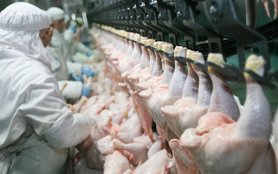A new Oxfam report illustrates how the pandemic is deepening the divide between winners and losers in the global food supply chain. Huge supermarket chains are delivering billions to shareholders and executives, while their workers are facing financial precarity and exposure to potentially fatal disease.
With nearly 150 million people fully vaccinated in the US, most of us are eager to go back to “normal”–returning to the workplace, seeing loved ones, and traveling. In stark contrast, however, we see that low-income countries have received less than one percent of global COVID vaccinations, leaving them vulnerable and experiencing devastating outbreaks of the virus.
This matters to all of us, for many reasons, but we should note that in the US, we rely on these places, as many of the food products on our supermarket shelves start there.
Early in the pandemic, world leaders repeatedly declared, “we’re all in this together”–but over a year into the pandemic, are we really all in this together?
The answer is, essentially, No. In fact, the pandemic has created a contrasting tale of winners and losers, as a new report from Oxfam lays out: Not in this together: how global supermarkets became the pandemic winners while women workers are losing out.
Supermarkets are the standout winners. Business was booming with record sales, and shareholders have enjoyed significant payouts. At the other end, frontline staff, supply chain workers, and farmers continue to suffer from worsening inequality and escalating rights violations.
Women have been hit the hardest; they have fallen into the “precariat trap,” which exposes them to significant economic, social and health risks brought by the pandemic. The report reveals how gender pay gaps and discriminations have worsened for women food workers.
Evidence also shows that leading US supermarkets-Albertsons Companies, Costco, Kroger, and Walmart-had a sales bonanza during the lockdown. Collectively, these publicly listed companies gained over $37 billion in extra revenues during the pandemic. Whole Foods, owned by Amazon, did not disclose its financial information separately, but Amazon’s revenue went up 38 percent, a yearly increase of over $100 billion.
While supermarkets have remained open and food has remained plentiful, the real heroes are the workers—in the fields, processing plants, and stores-who continue to risk their lives. During the worst stage of the pandemic, their urgent calls to improve workplace safety and offer hazard pay were largely ignored. Some workers were fired for organizing while many lost their lives-which could have been prevented if supermarkets had stepped up.
Outbreaks also occurred in global supply chains (such as the Thai seafood supply chain), with no apparent response from US supermarkets. Migrant workers in these supply chains are not legally allowed to join or form trade unions, and they continue to risk becoming undocumented workers and excluded from legal protections by shortcomings in the governments’ migration policies.
At the same time, the largest US supermarkets continued to pursue “business as usual” practices: maximizing shareholder returns and minimizing purchasing costs. The wealth of the Walton family (that owns Walmart) grew by $3 million an hour in 2020; Costco declared a special dividend of $4.4 billion to reward its shareholders, citing a “strong balance sheet.” In February 2021, Walmart announced it had increased the company’s dividends for the 48th consecutive year. Altogether, the four US supermarkets paid out nearly $13 billion in 2020, compared to $7.6 billion in 2019.
Meanwhile, the situation is getting dire in our global food systems. In 2018, when Oxfam first reported on the vulnerabilities and injustices faced by workers in the seafood supply chains in Thailand, it would have taken a woman worker processing shrimp more than 4,000 years to earn what the chief executive of a top US supermarket earned in a year. In 2020, it was up to 5,700 years.
But it does not have to be this way.
We are at an inflection point. The supermarket sector has a choice: the companies can continue on the current path and risk irreversible damage to their reputation and profits, or they can reimagine purchasing practices to protect people from exploitation.
The good news is that we already have the necessary tools. Many companies, like Albert Heijn, Lidl, Jumbo, Kroger, and Tesco have started to make significant steps toward ending human rights violations in supply chains.
Still, we need a bold commitment from major US supermarkets, and we need significant investment. The critical first steps are:
- Make a commitment to fundamentally shift the business model. Integrate sustainability and human rights into purchasing practices, revise sourcing policies and structures based on the UN Guiding Principles’ human rights due diligence obligations, and invest financial resources to fuel the transition.
- Identify those supply chains where women are at highest risk. Consult local stakeholders, including women’s rights organizations, and immediately take action.
- Prioritize gender equality throughout the supply chain. Track and publish information on the gender pay gap, adopt a comprehensive gender policy, and publish a timebound action plan to monitor progress.
- Demonstrate leadership by calling on the sector and governments to tackle these issues systemically. Positively influence public policy reforms on mandatory human rights due diligence and social protections for workers.
COVID-19 has laid bare and exacerbated inequality across the global economy. Few places reveal this trend more clearly than supermarket supply chains.
Certainly, we don’t want to get back to a “normal” torn by increased income inequality and human suffering. We can do better.



